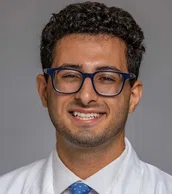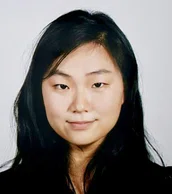

Archives
Houston Methodist Welcomes Residents from Texas and California
Houston Methodist Department of Otolaryngology – Head and Neck Surgery recently named two new residents, Sam Razmi, MD, from Texas A&M Health Science Center College of Medicine in Houston, and Ashley Kim, MD, from Weill Cornell Medicine in New York City.
The department’s five-year training program adds two residents every year. Next year, two more residents will complete the program of 10 as approved by the Accreditation Council for Graduate Medical Education (ACGME).
“Starting an ACGME-accredited residency training program was just an idea a few years ago. After countless hours and hard work, the idea became a reality in 2022 and has taken off since then. We are now into the fourth year of what is shaping out to be a top-notch program, gaining traction locally, regionally and nationally. We’re humbled to see how quickly we have grown and excited to see what the future holds,” said Nadia Mohyuddin, MD, FACS, residency program director.
Department Chairman Mas Takashima, MD, FACS, Sylvia and James E. Norton Distinguished New Century Chair Professor said the program is a “point of pride” for Methodist Hospital and all the faculty. Ultimately, the goal is to be the recognized leader in clinical care, education and scientific discovery and to provide comprehensive training to residents who can practice with confidence and expertise.
New residents Dr. Razmi and Dr. Kim come from both ends of the geographic spectrum and unique medical school experiences. A proud Texas native, Dr. Razmi grew up in the Dallas area and remained rooted in the Lone Star State for his undergraduate and graduate training at the University of Texas at Austin, followed by his medical education at Texas A&M Health Science Center College of Medicine in Houston. As part of the innovative EnMed (Engineering-Medicine) program — the first of its kind in the nation to offer a graduate-level engineering degree in tandem with a medical doctorate over four years — Dr. Razmi exemplifies the physician-engineer model.
With a background in biomedical engineering, Dr. Razmi has designed and developed several ENT-focused medical devices, many of which are now in the patenting process. His portfolio includes several ENT-specific innovations, reflecting his drive to marry technology with clinical care. His passion for translational research and medical innovation is what ultimately led him to pursue otolaryngology – head and neck surgery.
As a lifelong musician, Dr. Kim’s clinical experiences in laryngology fueled her passion for deep learning and big data research in otolaryngology. A pivotal moment came when she worked with a vocal performer who had undergone a total laryngectomy. “Watching her regain her voice and confidence was both exciting and humbling. Celebrating her progress reaffirmed my passion for the intimate, long-term relationships we build with patients in otolaryngology.”
Dr. Kim comes from California via her native Korea and spent just one day in Houston before accepting her residency position. “I’ve never been to Houston except for my interview day so it’s an unchartered area for me,” Dr. Kim reiterated. “I think it’s exciting to start a new chapter in a city that I’ve never lived in. I know Houston is full of opportunities; especially, there are a lot of opportunities in the intersection between otolaryngology and artificial intelligence. I’m looking forward to collaborating with clinical and computational experts to continue my research.”
“I don’t really have anyone I know. It’s going to be an experiment but an exciting one,” she added.
On the other hand, Dr. Razmi has been in Houston long enough to compliment the city in three areas – diversity, hospitality and good food.
“You’re constantly surrounded by people from all walks of life, and there’s always something to learn from every conversation — it’s a city that keeps you curious, connected, and well-fed,” Dr. Razmi said.
Here’s what the two new residents had to say about their experience thus far and anticipated training at Houston Methodist.
Samuel Razmi
Why were you interested in the Houston Methodist’s residency program in ENT?
One of the primary reasons I wanted to be at Methodist was its deep commitment to innovation, engineering and medical device development. I’ve always been driven to bridge the gap between technical advancement and patient care, and Methodist stood out as the ideal place to make that vision a reality. Over the last few years, I’ve been incredibly fortunate to be mentored by leaders in the field—people who not only shaped my understanding of otolaryngology but encouraged me to think boldly and creatively. The department's culture, from its visionary chair to its emphasis on cutting-edge, patient-centered care, truly reflects the future of medicine. I’ve always believed that engineering is at the forefront of medical progress, and at Methodist, I’ve found a home where that belief is not only shared—it’s actively being realized.

What qualities do you believe made you stand out as a residency candidate?
I think what helped me stand out as a residency candidate was a combination of curiosity, compassion and a deep respect for the human experience. I’ve always been drawn to understanding people—their challenges, their resilience and their stories. You never truly know what someone is going through, and I try to approach every interaction with that perspective in mind. Medicine, to me, is about being present for people at their most vulnerable and using your skills to help them heal—not just physically, but emotionally and with dignity.
Alongside that mindset, I’ve worked hard to pair clinical training with innovation, completing a dual MD and engineering degree while developing multiple ENT-focused medical devices, several of which are now provisionally patented. I’ve had the privilege of conducting meaningful research, collaborating with incredible mentors, and contributing to projects that aim to advance care for patients. But at the end of the day, I think what defines me most is my desire to serve, stay grounded and keep growing—both as a physician and a person.
What do you expect to find unique about your training at Houston Methodist and the Texas Medical Center?
What excites me most about training at Houston Methodist and within the Texas Medical Center is the sheer scale, complexity, and diversity of clinical experience it offers. Being part of the largest medical center in the world means constant exposure to high-volume, high-acuity cases—many of which are rare or uniquely complex. It's an unparalleled environment for learning. What makes Methodist stand out even further is its forward-thinking leadership and unwavering commitment to innovation, particularly within the ENT department. I’m eager to train in a setting where clinical excellence and cutting-edge innovation go hand in hand—where I can be challenged to grow every day while also contributing meaningfully to the future of patient care.
What do you want to do in Houston with any extra time?
I love working out, being outside and going on trails. Memorial Park at sunset is a joy of mine. I played soccer as a kid, and I love watching European football—Liverpool is my team. As a “foodie,” I love trying new restaurants or restaurants that are new to me. I don’t think there’s anywhere else in the country where you can get better food. You’re 10 minutes away from anything you want to eat,” he adds.
Ashley Kim
Why were you interested in the Houston Methodist’s residency program in ENT?
The Texas Medical Center and Houston Methodist stood out to me for its broad clinical exposure and the opportunity to care for a large, diverse patient population. I was especially drawn to its reputation for innovation and cross-disciplinary collaboration. During interview day, I was impressed by the program’s integration of artificial intelligence and data science into clinical research—particularly in imaging, diagnostics and outcomes prediction. Its close ties with computational scientists, clinical trialists, and bioengineers reflect a dynamic, research-driven environment that aligns closely with my research interests. Altogether, it offers the kind of rigorous, collaborative training I was looking for.

What qualities do you believe made you stand out as a residency candidate?
I play the oboe, which is a double-reeded instrument that works a lot like the human vocal cords. Playing music taught me early on the importance of communication and expression. It wasn't until I witnessed patients lose these abilities that I understood their deeper significance. Watching them reclaim their lives after surgery was a transformative experience, solidifying my commitment to helping patients reconnect with the world. My background gives me a deeper appreciation for the patients we serve in otolaryngology. Voice and swallowing may seem like basic functions, but they’re central to how we connect with the world—and for many of our patients, they’re essential to their careers. A significant number are musicians or voice professionals, and the impact of their condition extends far beyond health. In helping them recover, we are helping them reclaim both their professional and personal identities.
What do you expect to find unique about your training at Houston Methodist and the Texas Medical Center?
My clinical experiences have fueled my passion for research in otolaryngology. Primary care evaluation of otolaryngologic conditions remains rudimentary and often relies heavily on patient-reported symptoms, leaving gaps in early diagnosis. In the past, I led an interdisciplinary team of medical students, graduate students and computational scientists in developing deep-learning models to identify vocal fold pathologies using image and audio data from videolaryngoscopy. Ultimately, I aspire to become a leader, innovator and mentor in otolaryngology-head and neck surgery. Whether through surgery or technology-augmented tools, I am committed to helping patients reconnect with the world and their loved ones. I look forward to continuing this work in residency, where I can learn from mentors, refine my operative skills and contribute to advancing care in the field.
What do you want to do in Houston with any extra time?
In New York, one of the things I really enjoyed was exploring the city on foot—whether that meant stopping by a new coffee shop or wandering through the many free art galleries (for anyone in New York or LA, I highly recommend the SeeSaw app—it maps out current gallery shows and makes it easy to find something interesting nearby), and it was a nice way to unwind after long days. I also loved going to live shows and concerts when I had the chance, since there was always something happening.
I know Houston has a vibrant arts and culture scene as well, with places like the Museum District, local galleries and great music venues. I’m looking forward to discovering that side of the city, even if it’s just during the occasional free afternoon. Of course, residency will keep me busy, but I’m excited to get to know Houston in that same spontaneous, exploratory way.






